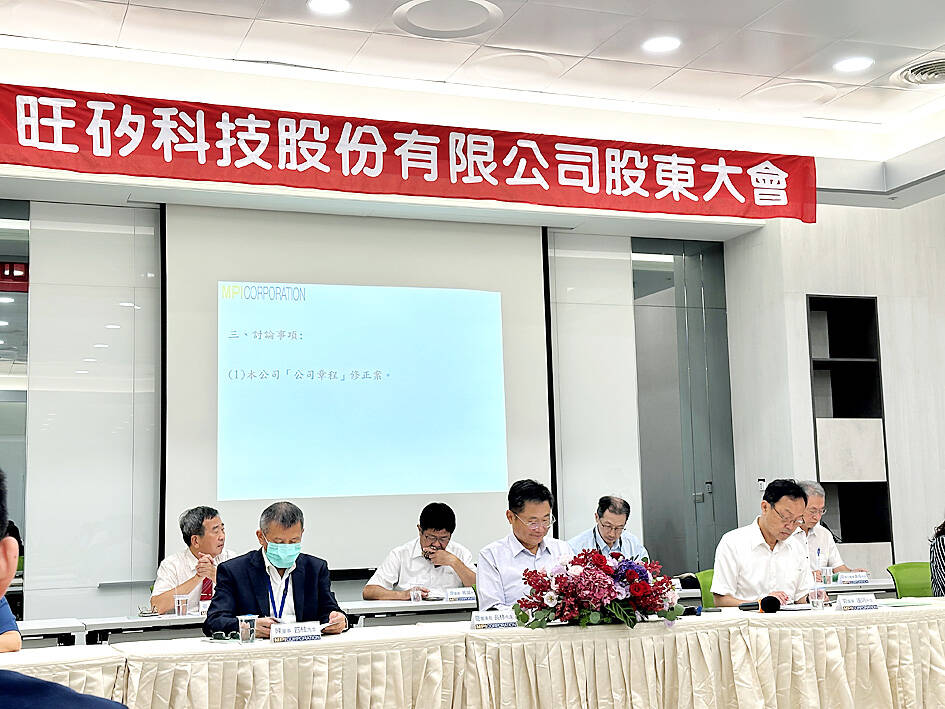MPI Corp (旺矽), a wafer testing services provider, yesterday said it aims to expand its probe card capacity by 30 percent this year in a bid to satisfy customers’ growing demand over the next few years amid the global artificial intelligence (AI) boom.
The new capacity expansion came as the company is still unable to fully satisfy customers’ demand after boosting capacity by 30 percent last year versus the previous year, the Chinese-language Liberty Times (sister paper of the Taipei Times) reported yesterday.
“The growth prospects for the [AI] industry are sustainable at least to the end of this year. Although the consumer electronics market is experiencing ups and downs, AI infrastructure deployment has become a priority for many countries,” the Liberty Times quoted MPI chairman Ko Chang-lin (葛長林) as saying on the sidelines of the company’s annual shareholders’ meeting in Hsinchu County’s Jhubei City (竹北).

Photo: Grace Hung, Taipei Times
“This industry is to be flourishing at least over the next 5 years,” Ko said. “That will help boost demand for advanced process technologies that are used to make AI chips as well as equipment and materials.”
Strong customer demand is driving MPI’s book-to-bill ratio to exceed one, Ko said.
Likewise, the utilization rate of its probe card factories is approaching 100 percent, he said.
To meet customers’ urgent demand, MPI is planning to add 30 percent probe card capacity this year, Ko said.
The company aims to launch a new factory in Hsinchu County’s Hukou Township (湖口) by the end of next year, with another new factory also being planned, he said.
Benefiting from strong AI-related demand, MPI expects revenue to grow more in the second half of this year from the first half, Ko said.
MPI’s revenue last month surged 50.66 percent year-on-year to NT$1.3 billion (US$43.45 million), representing the strongest May figure in the company’s history.
During the first five months of this year, cumulative revenue soared 39.41 percent year-on-year to NT$5.01 billion.
Probe cards accounted for 67 percent of the company’s revenue in the first quarter. The item acts as a connector between the wafer and testing equipment, allowing for electrical measurements of individual IC chips on the wafer before they are diced and packaged.
The company said it is capable of testing advanced chips such as those made with 3-nanometer process technology this year and would extend its testing scope to 2-nanometer chips next year.
MPI shareholders yesterday approved the distribution of a cash dividend of NT$16 per share, an all-time high, representing a payout ratio of 65.52 percent based on the company’s earnings per share of NT$24.42 last year.

In Italy’s storied gold-making hubs, jewelers are reworking their designs to trim gold content as they race to blunt the effect of record prices and appeal to shoppers watching their budgets. Gold prices hit a record high on Thursday, surging near US$5,600 an ounce, more than double a year ago as geopolitical concerns and jitters over trade pushed investors toward the safe-haven asset. The rally is putting undue pressure on small artisans as they face mounting demands from customers, including international brands, to produce cheaper items, from signature pieces to wedding rings, according to interviews with four independent jewelers in Italy’s main

Macronix International Co (旺宏), the world’s biggest NOR flash memory supplier, yesterday said it would spend NT$22 billion (US$699.1 million) on capacity expansion this year to increase its production of mid-to-low-density memory chips as the world’s major memorychip suppliers are phasing out the market. The company said its planned capital expenditures are about 11 times higher than the NT$1.8 billion it spent on new facilities and equipment last year. A majority of this year’s outlay would be allocated to step up capacity of multi-level cell (MLC) NAND flash memory chips, which are used in embedded multimedia cards (eMMC), a managed

Japanese Prime Minister Sanae Takaichi has talked up the benefits of a weaker yen in a campaign speech, adopting a tone at odds with her finance ministry, which has refused to rule out any options to counter excessive foreign exchange volatility. Takaichi later softened her stance, saying she did not have a preference for the yen’s direction. “People say the weak yen is bad right now, but for export industries, it’s a major opportunity,” Takaichi said on Saturday at a rally for Liberal Democratic Party candidate Daishiro Yamagiwa in Kanagawa Prefecture ahead of a snap election on Sunday. “Whether it’s selling food or

In the wake of strong global demand for AI applications, Taiwan’s export-oriented economy accelerated with the composite index of economic indicators flashing the first “red” light in December for one year, indicating the economy is in booming mode, the National Development Council (NDC) said yesterday. Moreover, the index of leading indicators, which gauges the potential state of the economy over the next six months, also moved higher in December amid growing optimism over the outlook, the NDC said. In December, the index of economic indicators rose one point from a month earlier to 38, at the lower end of the “red” light.